OPERATION MINCEMEAT (2021)
During WWII, British intelligence officers use a corpse and fake documents to mislead the German high command.
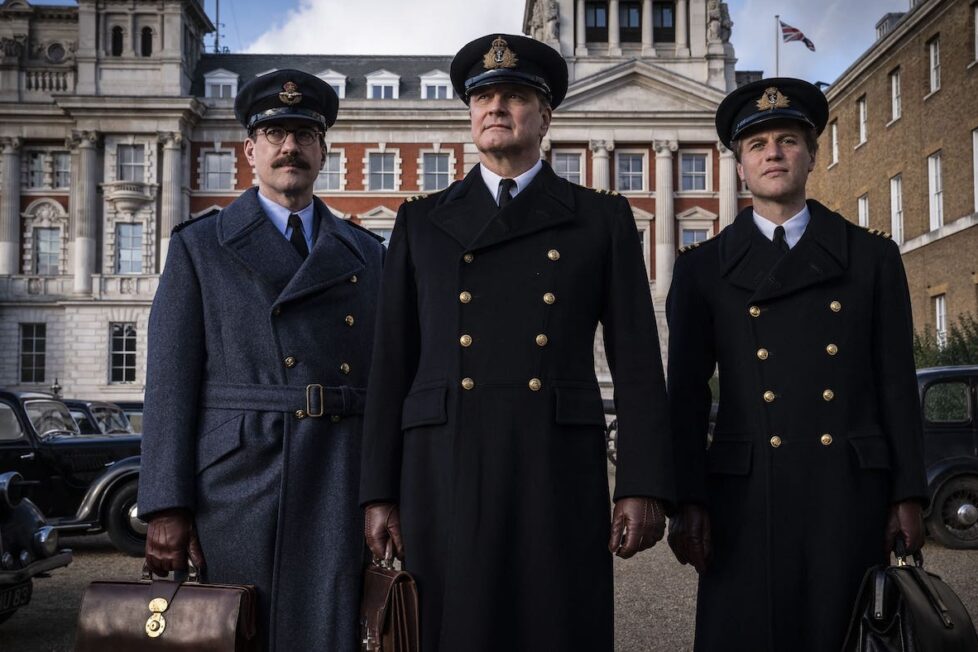
During WWII, British intelligence officers use a corpse and fake documents to mislead the German high command.


Director John Madden is perhaps best known for slightly twee celebrations of Englishness (Mrs. Brown, Shakespeare in Love, the Exotic Marigold Hotel films), and Operation Mincemeat certainly slots into that category, although in subject matter it also connects his Louis de Bernières adaptation Captain Corelli’s Mandolin (2001). It’s a return to World War II territory for screenwriter Michelle Ashford, too, following her acclaimed work on HBO miniseries The Pacific (2010).
But the tradition into which Operation Mincemeat most clearly fits is that of the stiff-upper-lip English war film, and indeed not only could it easily have been made 70 years ago, it pretty much was, as The Man Who Never Was (1956) told the same true story of an audacious deception that fatally misled the Nazis and made a significant difference to the progress of the war.
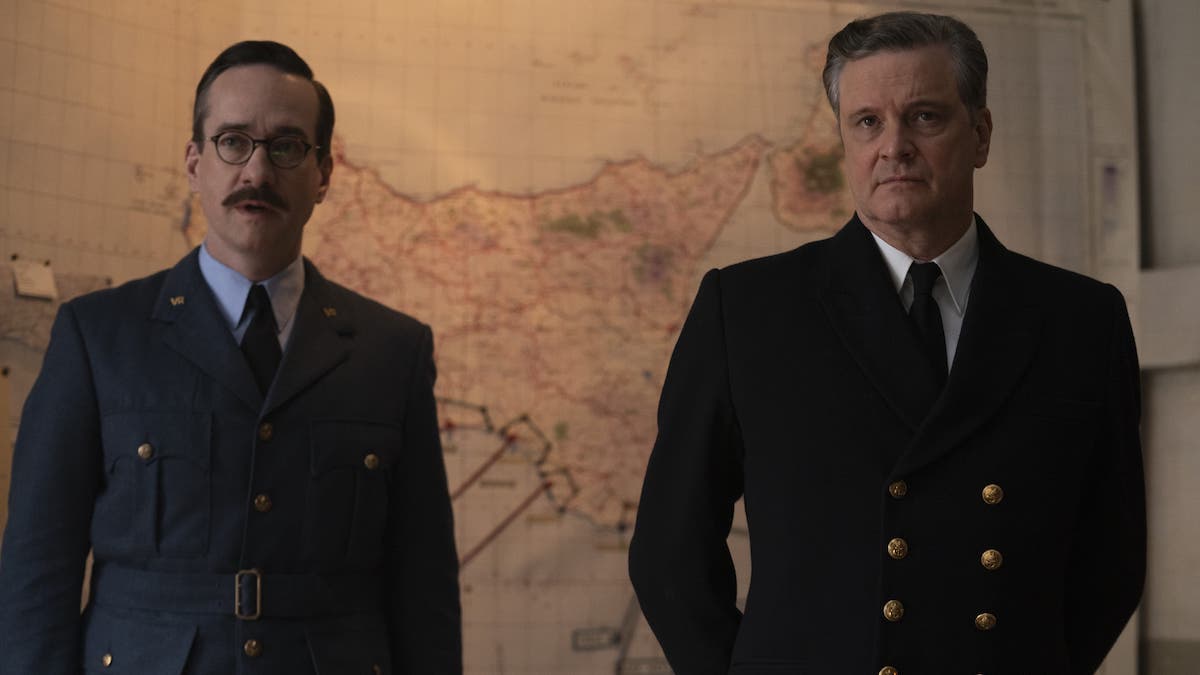
In 1956 all this was relatively recent history, of course, and the book by Ewen Montagu—one of the architects of the plan—on which the earlier film was based had been published only three years earlier. Now, with the war of 1939-45 receding into a past that’s no longer directly familiar to most people and won’t have such emotional resonance to many in the audience, there’s often less reverence in cinematic treatments. But Operation Mincemeat isn’t remotely revisionist or postmodern: although it’s not self-consciously archaic either, as it takes British pluck, ingenuity, and modest self-denying heroism unashamedly at face value.
The year is 1943 and the Allies, encouraged by their recent defeat of the Germans in North Africa, are planning their first large-scale assault on Nazi-occupied mainland Europe. Urged by Winston Churchill to focus on the “soft underbelly” of the continent in the Mediterranean, they have a choice between landing in Greece and landing in Sicily; they choose the latter, planning from there to fight their way up through Italy, removing Germany’s ally from the war and positioning Allied forces to head deeper into Europe.
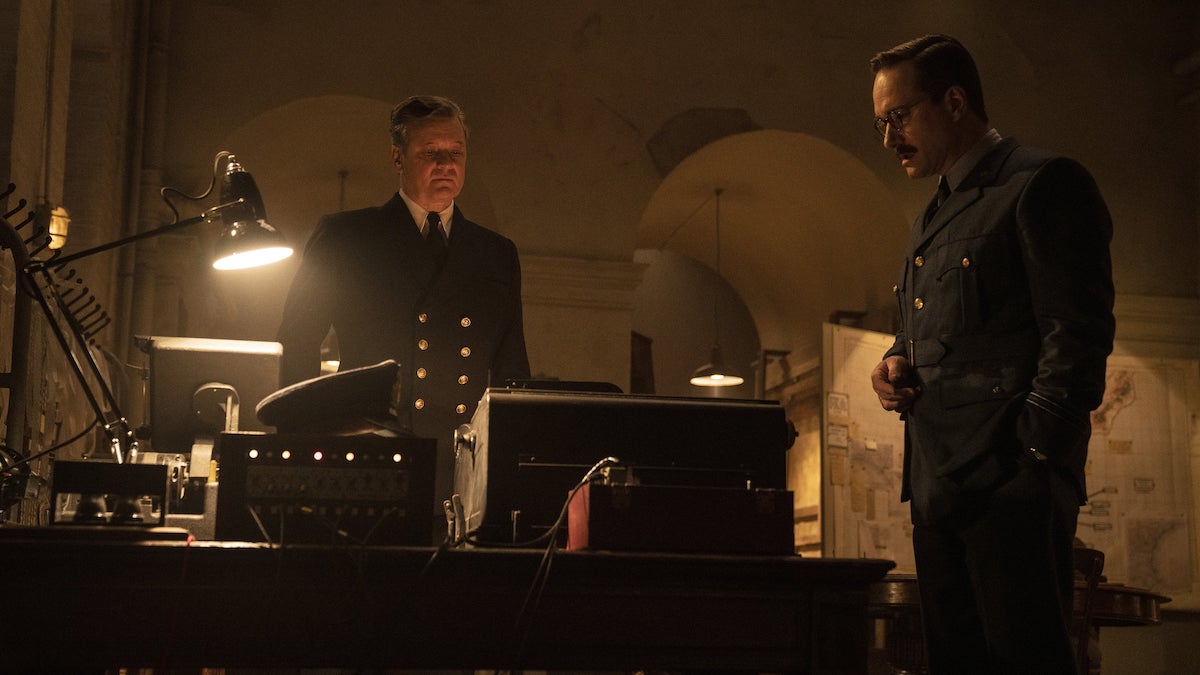
The problem is that a strong German defence of Sicily could lead to devastating casualties among the US, British, and Canadian troops landing on its beaches. But a possible solution was to trick Hitler and his generals into believing the attack would come through Greece instead, persuading the Nazis to concentrate their forces there—and so Operation Mincemeat was born, the brainchild of intelligence officers Montagu (Colin Firth) and Charles Cholmondeley (Matthew Macfadyen).
The plan called for a dead body, seemingly that of an accidentally drowned British officer, to wash up on the coast of Spain carrying documents that pointed to Greece as the invasion target. Spain was a neutral country but one with many fascist sympathisers, meaning there was a good chance of the documents making their way to Berlin and also that the British had a diplomatic presence there, enabling them to monitor the progress of the fictitious “Major Martin”’s briefcase and subtly steer it into German hands if necessary.
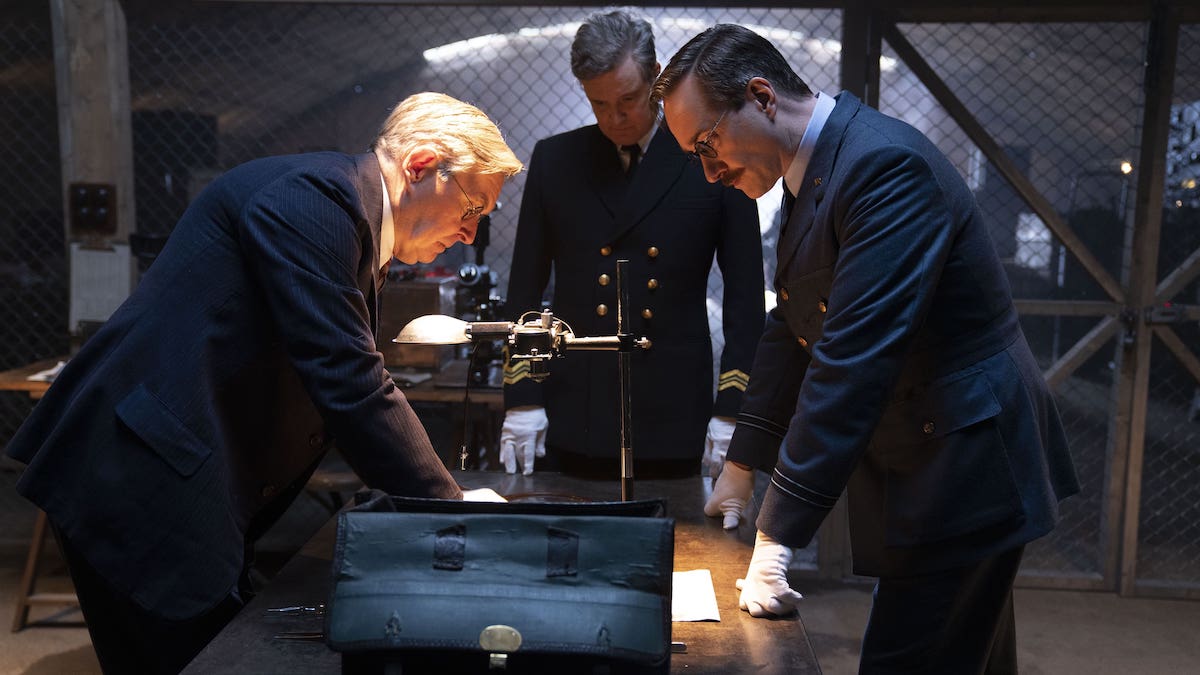
Indeed, many of the best passages in Operation Mincemeat concern not the conception of the scheme and its meticulous preparation—though those are fascinating, if undramatic, in themselves—but the nail-biting moments when the Spanish seemed all too willing to give the briefcase back to the Brits, unaware that for once the Allies really wanted these particular “secrets” to reach the enemy.
Back in London, meanwhile, there’s the expected love triangle involving Montagu, Cholmondeley, and the young widow Jean (Kelly Macdonald) who works in their department; there are the expected scenes discussing plans with Churchill (Simon Russell Beale) and the expected difficulties with a sceptical senior officer, Admiral John Godfrey (Jason Isaacs). Less expectedly, there’s also the young Ian Fleming (Johnny Flynn) hammering away at espionage stories on his typewriter; the real Fleming was, indeed, involved with Mincemeat as Godfrey’s assistant, and the number of officers writing novels in their spare time becomes a gentle running joke in Operation Mincemeat.

Absolutely nothing in the film is other than one would expect, then: it really could have been made several decades ago! But it benefits from telling a tale which is inherently interesting and, though familiar to military-history buffs, unlikely to be familiar to general audiences. Madden’s direction is smooth without ever being clever-clever (that really wouldn’t be British) and Ashcroft’s screenplay not only conveys the historical context exceptionally well, but also manages to spring occasional mild surprises.
What really makes it all work, fundamentally, is the cast. Firth as Montagu is, of course, the John Mills de nos jours whose presence seems to be a legal requirement in films of this kind, and nobody does dedication to duty despite personal tragedy better. We’ve seen it many times before but that’s not really a problem here because we have, essentially, seen this movie many times before anyway.
Macfadyen is a bit more prickly as his colleague, as committed to the job as Montagu but a little irked by the way he can’t reveal to his elderly mother just how important his work is (she thinks of him as a mere clerk, and his brother as the real war hero). Macdonald is believable as a young lady emboldened to speak her mind by the increasingly responsible jobs that women were taking on during the war; Penelope Wilton as an older woman on the Mincemeat team, equally tough in character but less headstrong, makes a good foil to Macdonald.
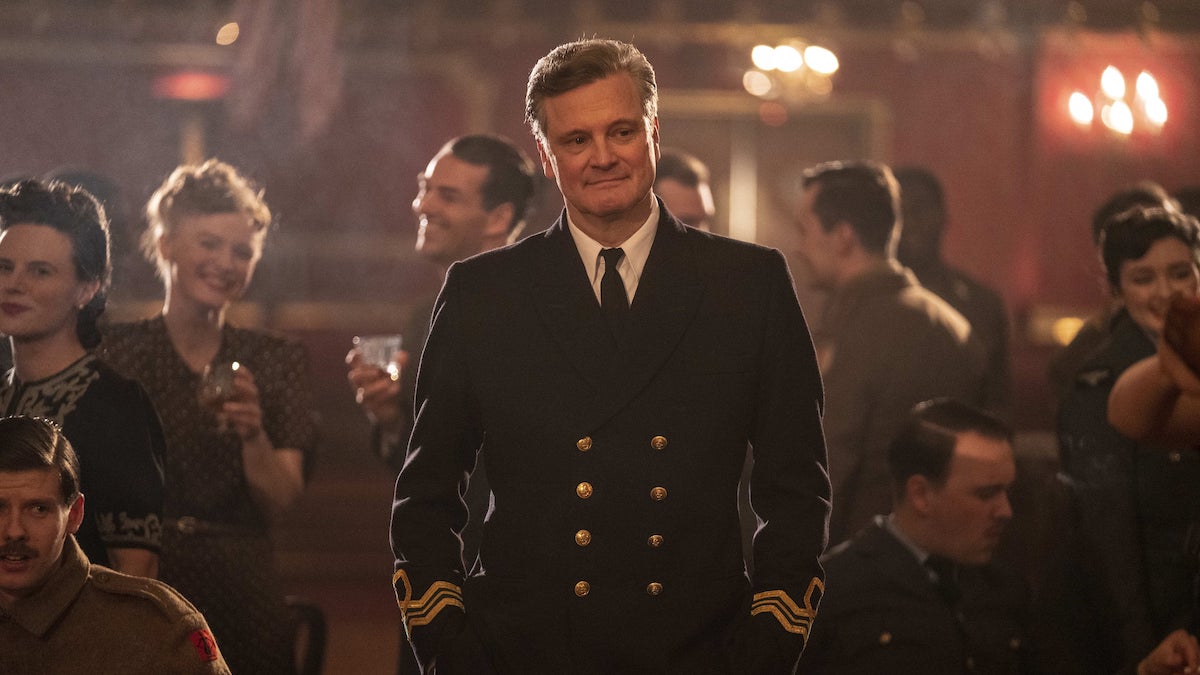
Flynn is amusing as Fleming, as is Mark Gatiss as Montagu’s dilettante brother; Beale is a credible addition to the recently growing roster of screen Churchills (even if he doesn’t have the chance to develop the character nearly as fully as Gary Oldman did in 2017’s Darkest Hour). Nicholas Rowe, meanwhile, verges on quietly scene-stealing as a British diplomat in Spain, though no actor in this film would really do anything as un-English and ungentlemanly as actually steal a scene from another chap. (Mark Bonnar, as a booze-soaked driver assigned to transport the body of “Major Martin” across Britain, does come close.)
There’s nothing shocking or even challenging about Operation Mincemeat. Indeed, if it has a real flaw it is probably that—as with so many films of this kind—everything is so damned civilised and the tang of nostalgia so difficult to avoid that it’s easy to forget the early 1940s were desperate times, and that these characters were engaged in a violent, existential struggle.
Still, it doesn’t go to excessive lengths in glossing that over, either, and if we don’t ever really feel any sense of great threat we do feel some of the personal losses brought about by the war. Plus, it’s a damned good yarn.
USA • UK | 2021 | 128 MINUTES | 2.35:1 | COLOUR | ENGLISH

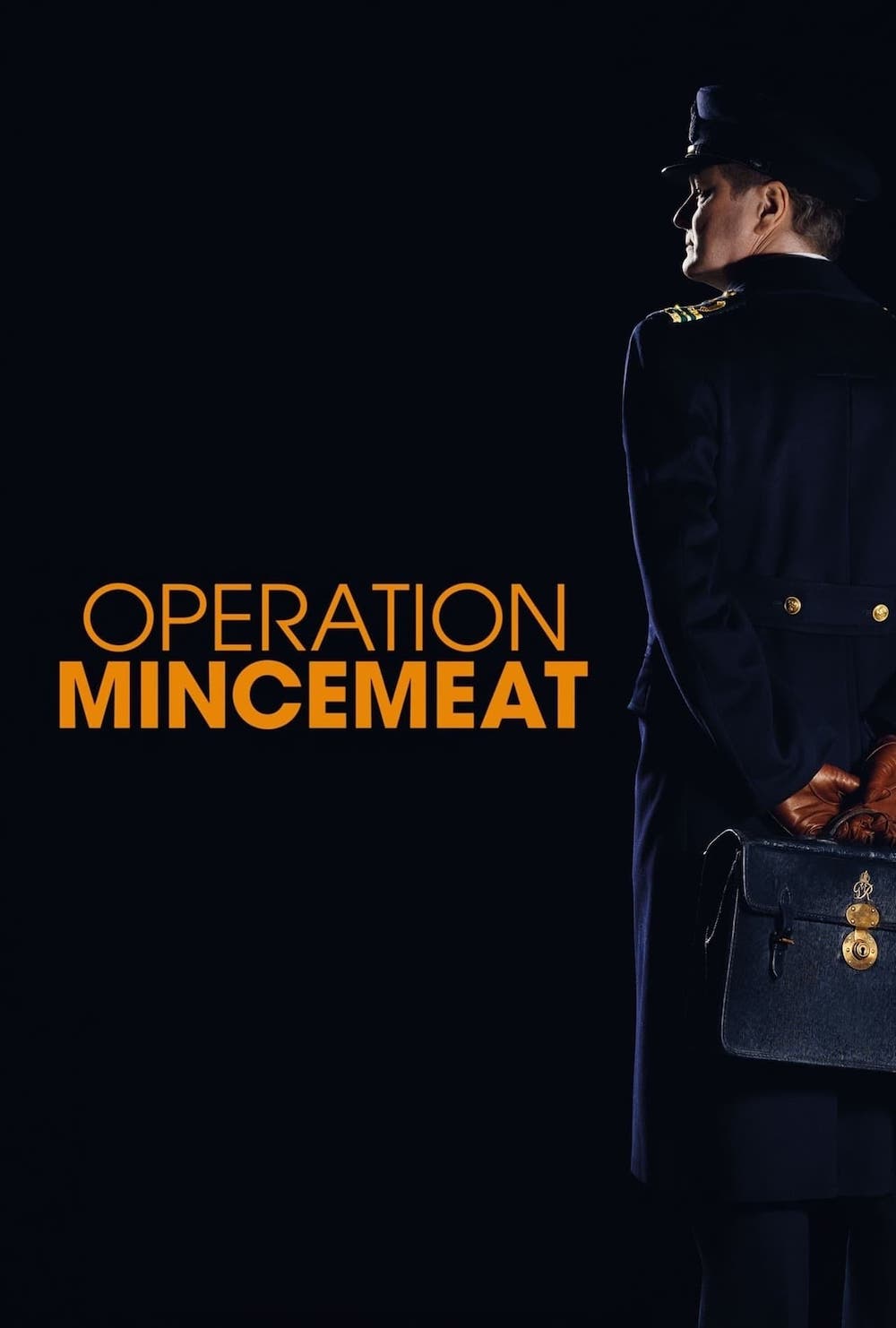
director: John Madden.
writers: Michelle Ashford (based on the book by Ben Macintyre).
starring: Colin Firth, Matthew Macfadyen, Kelly Macdonald, Jason Isaacs, Penelope Wilton, Johnny Flynn & Mark Gatiss.
